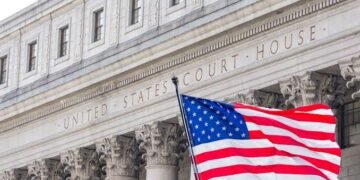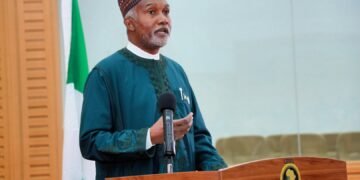By Tosin Adeoti
It was Upton Sinclair who said that it is difficult to get a man to understand something when his salary depends upon his not understanding it. This is an apt description of the Federal Government as it wages battle against the States of the Federation on the matter of the collection of Value Added Tax in the country.
On August 9, 2021, the federal high court sitting in Port Harcourt ruled that the Federal Inland Revenue Service (FIRS) – the agency responsible for assessing, collecting, and accounting for tax and other revenues accruing to the Federal Government of Nigeria – should stop collecting value-added tax (VAT) and personal income tax (PIT) in Rivers state. It directed the Rivers state government to take charge of the collection. (1)
Without wasting time, the Governor of Rivers State, Barr Nyesom Wike on the 19th of August 2021 signed into law the Rivers State Value Added Tax Law which provides for the imposition and administration of Value-Added Tax (VAT) in Rivers State. (2) In its judgment, Justice Stephen Pam stated that there was no constitutional basis for the FIRS to demand for and collect VAT and other such taxes in Rivers State or any other State of the Federation, being that the constitutional powers and competence of the Federal Government was limited to taxation of incomes, profits and capital gains, which does not include VAT and others of such taxes.
Promptly reacting, on August 23, FIRS went public warning taxpayers that refusal to pay VAT to the federal government’s agency will lead to penalties. The FIRS urged taxpayers, especially those in Rivers State to continue to pay their VAT to it to avoid paying penalties for failure to do so. It also told the public that it has appealed the judgment as well as a stay of execution so that the Rivers state government would not go ahead with the tax collection. (3)
A couple of hours ago, a Federal High Court sitting in Port Harcourt dismissed the suit by the FIRS seeking to stop the Rivers State Government from commencing the collection. River States is therefore moving forward with the tax collection.
It’s been a drama of some sorts, but you are probably wondering, what is VAT and how does it concern me?
What is Value Added Tax?
The first thing to know is that you pay VAT. It is a type of consumption tax. You have an internet subscription, you have paid VAT. You make a phone call, you pay VAT. You buy a bottle of water; you have paid VAT. (4)
Tax personnel will tell you that the good thing about VAT is that everyone pays it – whether rich or poor. Your economic status does not matter. The reason is because the tax is paid every time goods are sold. The manufacturer charges the wholesaler VAT and pays the tax to the government. The wholesaler charges the retailer VAT and pays the government the tax minus the tax it has already paid to the manufacturer. The retailer charges the final customer VAT and pays the government the tax minus the tax it has already paid to the wholesaler.
In order words, it is a tax that is charged on the value which a citizen derives from the purchase of goods and services as against a tax that is charged on the income of a citizen.
The Value of VAT
When Wike of Rivers State was defending the collection of VAT by the state, he said something interesting,
“In this (Rivers) state, we awarded contracts to companies and within the last month we paid over N30 billion to the contractors and 7.5% will now be deducted from that and to be given to FIRS. Now, look at 7.5% of N30billion of contracts we awarded to companies in Rivers State, you will be talking about almost N3 billion only from that source. Now, at the end of the month, (the) Rivers State government has never received more than N2 billion from VAT. So, I have contributed more through the award of contract and you are giving me less. What’s the justification for it?” (5)
That’s an interesting observation because it touches at the heart of the agitation for states to collect taxes. According to the VAT Act, 2004 (as amended in 2020), FIRS by section 7 is charged with the administration, management, and collection of VAT in Nigeria. (6) The current rate is 7.5% having been increased from 5% when signed into law in January 2020. (7) Once the VAT is collected, the agreed sharing ratio is applied. The Federal gets 15%, States get 50% and Local Governments get the balance of 35%. Before all these, the FIRS keeps 4% as the cost of collection.
And that’s where it gets tricky. Three of the 37 states (FCT included) in Nigeria provide 81% of the VAT collected by the FIRS. (8) Lagos has the highest VAT collection, amounting to 55% of Nigeria’s VAT. FCT has second place with 20%, while 6% is from Rivers. If you remove Kano’s 5%, 33 states provide only 14% of the total VAT in Nigeria; Lagos provides 4 times what 33 states provide combined! That seems an unfair deal considering several states in the country, through Sharia, do not permit the sale of certain goods and services.
A case in point: In November 2020, the Vanguard reported that the Hisbah Board destroyed about 2 million bottles of beer worth over N200 million confiscated in Kano (9). In February 2021, 3000 alcohol bottles were destroyed in Katsina. (10) In the same month, Bauchi state destroyed 260 crates of alcoholic drinks. (11) In May, Jigawa State arrested six persons while confiscating 453 bottles of assorted beer. (12) This happens every month in the Northern states. Kano took it a notch higher two months ago when the Hisbah Board declared war against the use of mannequins, threatening to apprehend and prosecute users of the object for the display of clothes in the state. (13)
In other words, certain states refuse certain businesses from operating in their states, yet collect taxes from them when other states allow them. It seems ridiculous that a state like Niger revoked all licenses of liquor dealers throughout the state yet collected VAT from other states like Lagos where alcohol businesses are allowed to thrive. (14)
It was therefore expected when Lagos swiftly pounced on the news and insisted that following the judgment in Rivers State, FIRS should stop issuing demand notices for payment of VAT in the state. (15)
Nigerian States Are Ripe for Fiscal Autonomy
Of course, while States like Lagos and Rivers are joyous about the ruling, it is expected that states like Ekiti, Kwara, Bayelsa, Kogi, and Zamfara will be unhappy.
For instance, in the first half of 2021, VAT collected comes to N1trillion. (16) By extrapolation, we should expect that by year-end, it should rise to N2 trillion. This would be a 30% increase from the total sum of N1.53 trillion revenues it generated in 2019. (17) It should be noted that VAT recorded in 2019 was N1.18 trillion. This shows that while there is a year-on-year increase in the taxes collected, a state like Lagos isn’t getting anything commensurate. From calculations, Lagos got N21billion in VAT revenue last year from FIRS but the State Assembly said N500 billion worth of VAT was collected from businesses operating in the state. (18)
So Lagos and Rivers are expected to make more while many other states would be biting their nails wondering what hit them.
But it’s a good problem viewed from a long-term angle. Right now, there is little incentive for the states to be productive. Every month, states go to Abuja cap-in-hand to collect federal allocations. Even worse, these states are so unproductive that many of them spend all they receive in the payment of salaries leaving little or nothing for capital projects.
Two months ago, it was reported that Kogi State House of Assembly lawmakers have shunned plenary sessions over delay in payment of their salaries. (19) With dwindling federal allocations arising from a drop in oil revenue, many state governments are finding it increasingly difficult to meet their obligations to workers and other residents. Salaries of workers in some ministries in Abia states are not being paid. (20)
In January this year, the Kano State Government decided that it could no longer pay the minimum wage of 30,000 and reverted to the former wage of N18, 000 for its workers. “What we are getting now as a government has reduced and we can’t afford to pay the N30, 000 minimum wage,” the State said. (21)
States have decided not to do the creative work of making their states viable for investments because of the handouts from the federal government. The ease of doing business has taken a back seat because whatever they do, the federal government will provide some funds at the end of the month. Unfortunately, the era of oil is going, and with VAT from Lagos likely out of the equation, it is hoped that they will start the necessary work of putting their destinies in their own hands. In a previous article, I opined that Nigeria should harness sectors where they have a comparative advantage. (22) It is advice that is even more fit for the state governments. States have boards that are supposed to be revenue-generating entities still waiting for the government to pay their salaries. We have water boards in Kwara state waiting for the government to fund their operating costs when they are already into the provision of services to the states. It is only fiscal autonomies that can jolt these states into taking appropriate actions.
It is ridiculous to hear that some states are against the collection of VAT in their states because they lack the capacity to collect VAT receipts. Lacking the technical and organizational capacity to manage the process of VAT receipts is a poor excuse. Capacity is developed and the states need to take responsibility for it.
Reacting to the issue, the Plateau state government said, “How many industries do we have in Plateau State? There are not many. So, the position of the Plateau State Government on VAT is that the Federal Government, through the FIRS, should continue to collect VAT on our behalf and thereafter remit the proceeds to us.” (23)
It is an untenable excuse. Simply make your states attractive to industries.
Gombe State government said that states lacked the capacity to effectively carry out that responsibility so the Federal Government should continue collection.
Another untable excuse. There are several solutions to not having capacity now. States like Lagos can help with building such institutions for them for a fee. The Federal government can make arrangements where shortfalls in revenues by the states are covered over certain periods till the states can stand alone.
It can be done if the states desire for it to be done so that the attitude of waiting back, expecting allowances from the public while the political office holders enjoy the perks of office can be curtailed.
However, as I said in my opening sentence, it is difficult to get a man to understand something when his salary depends upon his not understanding it.
































